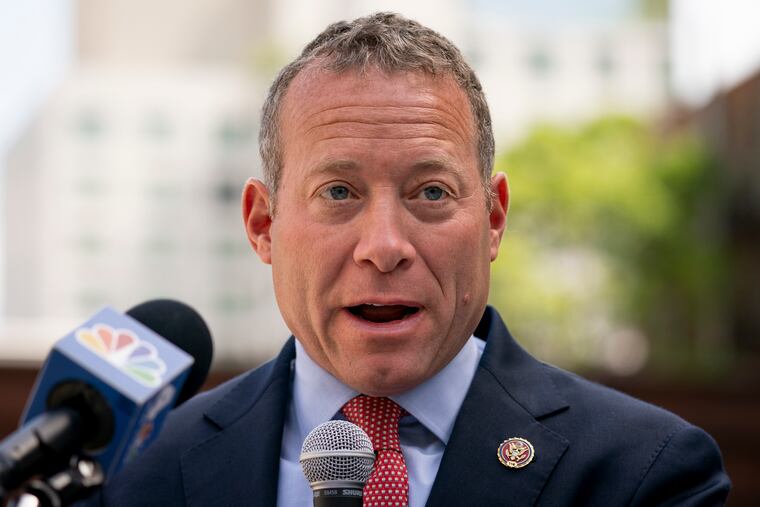House Dems reach deal on policing bills ahead of midterms
House Democrats announced the deal Wednesday, ending months of intra-party tensions over what the package should contain.

WASHINGTON — Progressive and centrist Democrats in the House have clinched agreement on a long-sought policing and public safety package that will be brought to the House floor just weeks before the midterm elections.
House Democrats announced the deal Wednesday, ending months of intra-party tensions over what the package should contain. A series of four bills that will include an increase in funding for local police departments will come up for a vote on Thursday.
The breakthrough came after intense negotiations in recent days between Rep. Josh Gottheimer, a New Jersey Democrat and leader of the centrist coalition, and Rep. Ilhan Omar D-Minn., one of the leaders of the progressive faction.
Joyce Beatty, chairwoman of the powerful Congressional Black Caucus, and Hakeem Jeffries, chairman of the Democratic caucus, facilitated a number of the conversations after it was clear in recent days that progress could be made.
“We have people who still won’t like this bill, and I respect that tremendously,” Beatty, an Ohio Democrat, told reporters shortly before the deal was announced. “And we have people who will say we move the needle by listening and working with everyone.”
Their deal, reached with little time to spare on the House calendar, could help unite the party on a public safety platform more than two years after the police killing of George Floyd.
“I’m proud to have worked closely with Republicans, Democrats, and a broad spectrum of stakeholders to make real progress for public safety," Gottheimer said in a statement Wednesday.
The package includes reforms to ensure police funding is used to support smaller police departments, along with investments in de-escalation training and $250 million for mental health resources for officers. A major goal is to reduce fatal encounters between police and people with mental illness.
To get the more liberal members on board, the final package also includes limited language around police accountability that would allow the Justice Department to have preferential consideration over which police departments are permitted to receive the grants. It will also allocate $50 million of the funding to go toward data collection on police practices and community safety.
“With this package, House Democrats have the opportunity to model a holistic, inclusive approach to public safety, and keep our promise to families across the country to address this issue at the federal level,” Omar and Rep. Pramila Jayapal, chair of the Congressional Progressive Caucus, said in a statement.
The police funding package is modest in comparison to the bill that Democrats introduced in the weeks after Floyd’s death in the summer of 2020.
That sweeping package, which passed the House more than a year later, went much further as far as police accountability, including banning police chokeholds and altering so-called qualified immunity for law enforcement, which would make it easier to pursue claims of police misconduct.
The unprecedented effort by lawmakers to curb police violence was stalled in the Senate for weeks as Republicans tried to push forward a competing plan by Sen. Tim Scott, R-S.C., which would have diminished the use of chokeholds --not ban them -- as well as increase federal reporting requirements for use of force and no-knock warrants. Senate Democrats blocked the plan, saying it did not go far enough to address racial inequality.
The new package, Gottheimer said, has gained the support and input of law enforcement groups like the National Association of Police Organization and the Fraternal Order of Police.
Other policing bills proposed by Reps. Abigail Spanberger of Virginia and Dean Phillips of Minnesota are not part of the package. But Spanberger, who has worked for the last year on a bill that would help increase officer pay and allow police departments to hire more officers, said it’s important that the party take action.
It is unclear if the bills will have any Republican support. Some quickly criticized the package.
“These are efforts to repair their image with voters who blame them for higher crime rates," said Rep. Jim Banks, R-Ind., the chair of the Republican Study Committee. “The Democrats know that their anti-police rhetoric over the last few years has harmed them in key districts that they need to keep the majority, which they are not. This is a top-of-the-list item for voters.”
Rep. Steven Horsford, D-Nev., said he's not betting on bipartisan support, given the GOP plans to make crime a focal point in the fall campaign.
“I'm not worried about the other side,” Horsford said. “I'm worried about saving lives and reducing crime and breaking the cycle of violence."
“I lost my father to gun violence when I was 19, so it’s personal,” he said.